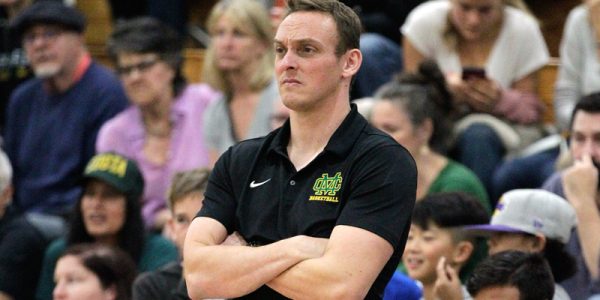by Mark McDermott
Very early most mornings, when The Strand the pier are mostly isolated and the most wakeful population of Manhattan Beach are its surfers and sea birds, you will find a man with a shock of white hair walking alone along the beach, stopping every so often to pick something up, almost like some newly invented form of Tai Chi that includes trash collecting.
His name is Joe Franklin, and he happens to be the mayor of Manhattan Beach. This daily habit of incrementally beautifying his adopted hometown is not a mayoral duty but something he’s done for years out of the sheer exuberance and gratitude he has felt living here for the last four decades.
“Manhattan Beach is just a wonderful town, I just don’t like to see trash,” Franklin said. “But also, we’re just such an international destination now. When I travel around the world, you don’t want to see trash. So it’s no big deal. I’ve reconciled myself to the fact that 5 to 10 percent of people are litter bugs. But it helps me with my morning routine.”
Franklin, who is the only incumbent in the November 5 City Council race, is running for the same reason he ran four years ago. He’s madly in love with Manhattan Beach, where he raised his family through local schools and volunteered as everything from “Stopper” the walking stop sign in a public safety campaign 20 years ago to the orange clad “Measure B Monster” for a school bond campaign.
“What made Manhattan Beach special 40 some odd years ago when I came here was the work of all the previous city leaders and the residents before me,” Franklin said. “So I always feel like I have to respect that. Anybody who came to Manhattan Beach, they came here for a reason …. We want to keep the essence of what this special place is, and preserve that for future generations, and quite frankly, selfishly, for my family and my grandkids and their kids. So that’s what I feel is my obligation, to be in this big playground.”
What is different this time is that after his first term on the council, Franklin has an even clearer idea of things he can do to help his city. He said that learned from working alongside Steve Napolitano and Richard Montgomery — both termed out — for the last four years.
“No matter what the preparation, it’s like a 10K race,” he said. “You don’t go out today and decide that you’re going to run a 10K. You have to get yourself in condition. You’ve got to train. So in the case of transferring that to council, you’ve got to learn. I ran with Steve and Richard, and between them, that’s almost 40 years on the council. That’s a lot of institutional knowledge, so I took advantage of that and asked the questions. And then you have to do your own research, and I think that has been one of my strengths. Finally, it is up to you to go out and talk to residents of all beliefs and opinions, and to work with your fellow council members … .It’s compromising and building a bridge. Not everybody gets everything they want but you built that bridge so that you satisfy the needs of the majority, and in some cases, the minority of residents. Sometimes the minority needs to be protected, so you have to be cognizant of that.”
Franklin, who worked in educational sales and commercial real estate, is now retired and quite literally puts in full time hours to the City. It shows, on the dais, as he has pored over the often three-inch thick staff reports, pulling items off the consent agenda, including one treasurer’s report that showed parking citation revenue had declined. Enforcement had previously been outsourced, he discovered, and revenue had declined since it was taken in-house.
“We had to build up our community service officer force and then beef that up,” Franklin said. up. “So there was an explanation, but it’s been turned around. Just seeing things like that are important. Because, quite frankly, we need revenue. Our residents demand these top services.”
Franklin received an education on the many functions and challenges of municipal government during a term that included helping navigate the City through a global pandemic. He was an outspoken advocate for the emergency outdoor dining program, in which the City was far ahead of most other LA County cities, declaring public space in its downtown as parkettes to better enable expansion to outdoor seating. This council also addressed structural problems in its budget, including a stormwater fee increase that finally stopped millions of dollars from being bled from the general fund. And he was a staunch advocate for public safety and vigorously supported the hiring of seven new police officers.
In order to better fund the City’s many infrastructure needs, including the replacement of Parking Lot 3, Franklin is also arguing on behalf of the proposed half-cent sales tax on the November ballot. He said that the $5.3 million in revenue it would produce would enable other funding mechanisms to tackle the estimated $200 million in infrastructure needs the City faces.
“The best way to stretch your dollars is to go out and get a bond,” Franklin said. “That is how the police and fire station was built, right? And so you’ve got to be a bondable city. You need to prove, through your income flows, that you have the means. You may have physical asset value there, but if you are paying off a bond, that’s cash flow … .Right now we’ve got a AAA bond rating, and that is because we are very careful about how we obligate the City with these projects.”
“So with the sales tax, I know a lot of people say, ‘Hey, we’re taxed to death. But the one thing about the sales tax issue, is that it’s placing some of the burden of the infrastructure on the visitors who come into town. They’re using our roads, our parking lots, stop lights, safe sidewalks, you name it. Well, it’s been researched, and 60 percent of our sales tax revenue comes from visitors, so now we are placing a little bit of the burden on them.”
Franklin is well aware many of the other council candidates are talking about e-bike safety, and he takes that as a compliment of sorts, because he was among those who first brought the issue to the fore at City Council, resulting in a new set of safety measures and increased fines. But as an avid cyclist, he also took it a step further, and went out with police officers to local schools to conduct e-bike safety assemblies. They reached 4,000 students, and then also conducted meetings with LA County Jr. Lifeguard classes.
Like trash collecting, none of this came with his job title as mayor, or city councilperson. It came from a sense of obligation to a town Franklin believes in, and the idea that it takes a village.
“Anybody who’s riding an e-bike, they need to know the rules of the road,” Franklin said. “How do we expect the kids to follow the rules of the road if they don’t know the rules of the road? So it was our obligation to teach them.” ER








